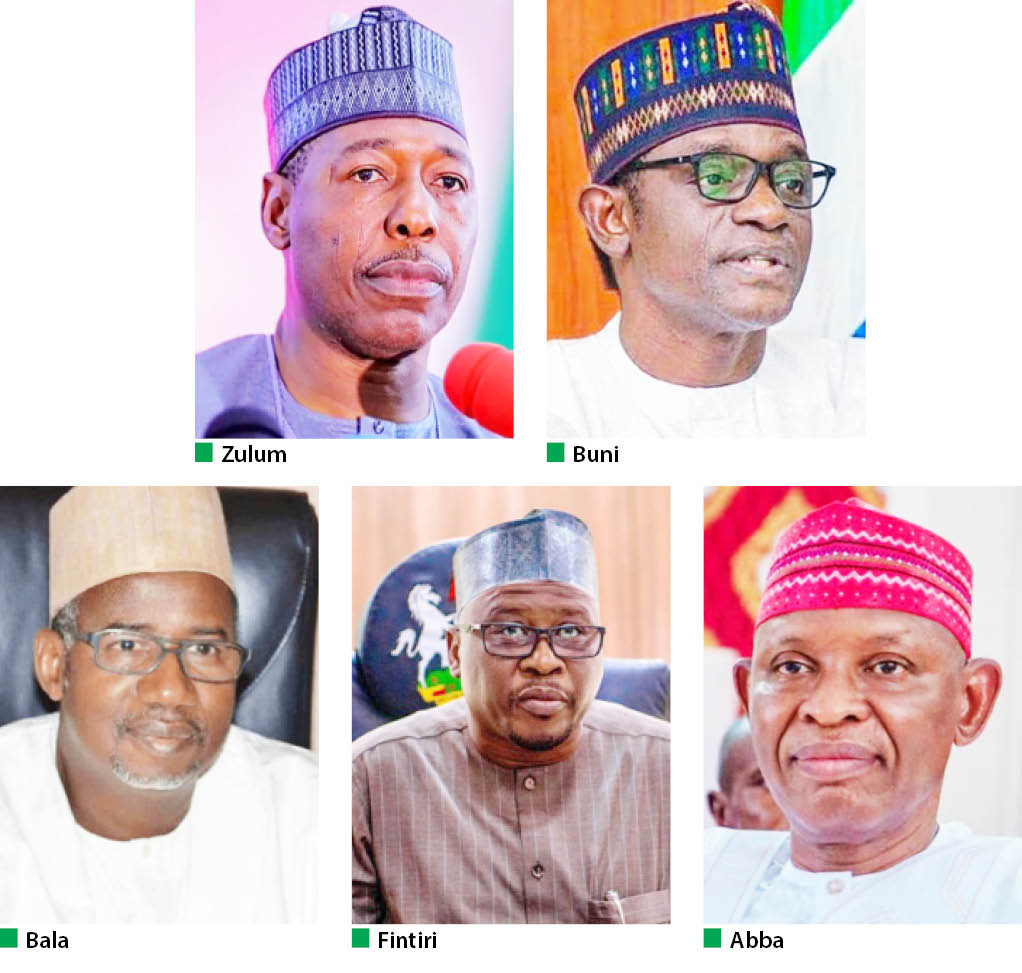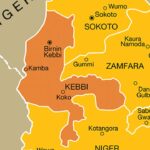From Hamisu Kabir Matazu (Maiduguri), Hassan Ibrahim (Bauchi), Amina Abdullahi (Yola) & Ibrahim Musa Giginyu (Kano)
Farmers across the four states of North East said they had recorded irrecoverable losses as a result of erratic rainfall they experienced this season.
Also, North East governors, under the aegis of North East Governors Forum (NEGF), had during their eight meeting in Maiduguri last week, expressed fear that the erratic rainfall would affect farming yield in the region.
The chairman of the forum, Prof Babagana Umara Zulum of Borno, further called on the federal government to intervene, and assured the commitment of the governors to deal with issues of climate change in the region.
However, the most affected states in the region are Borno, Yobe, Bauchi and Adamawa, where these farmers claimed to have invested huge amounts of money and energy into their agricultural fields.
CDS visits Zaria, commiserates with emir over mosque collapse
Nigeria @63: Akpabio, Abbas, Barau, others urge Nigerians not to despair
Borno
In Borno, the northern part of the state, which includes communities in Abadam, Kukawa, Guzamala, Mobar, Monguno, Kaga and other communities in central parts, are the most affected.
One of the farmers in Mobar, Babagana Ali, explained that the prolonged erratic rainfall had affected what they had planted early, especially crops that are not drought-resistant.
“We had to start afresh. We did a fresh planting of drought-resistant crops like millet, guinea corn and beans. For the millet and guinea corn, we just took the risk, hoping that the rainfall would exceed September. But for the beans, we are expecting a good harvest.
“That’s why we resorted to special prayers in mosques and churches for God’s intervention,” he said.
Another farmer, Abubakar Bakura, also said he replanted his crops after the ones early planted dried up. He called on people to mend their relationship with God.
“My greatest fear is drought, especially now that we face a similar fate with Niger Republic. You know, both countries relied on each other when it came to grains and livestock businesses. So, any tendency of food crisis in Niger would definitely affect Nigeria, all things being equal.
“Before this time, once people offered the special prayer, it rained, even before they returned home, but you’ll wonder what’s happening now. You will see clouds as if it would rain the next minute but it would disappear,” he said.
Yobe
In Yobe, communities in Gaidam, Yunusari, Machina, Damaturu, Dapchi local government areas of the state that are bordering Niger Republic were also affected by the erratic rainfall.
One of the farmers in Damaturu, Yunusa Mamman Sule, said the consequences of the erratic rainfall had caused many farmers and pastoralists to lose their livestock.
“Many people sold their livestock and invested the money into their farms and the season didn’t favour them.
“A friend sold a ram that was priced N120,000 during Sallah period at N50,000, paid for tractor harrow and planted groundnut and corn, but they all withered and weeds took over the field.
“Yusuf is just one of many farmers that refused to store grains in their homes to make this failed investment, and now, the price of grains is skyrocketing,” he said.
Sule also shared a pathetic story of a pastoralist that lost part of his herd – about 10 cows – at an outskirts farm in Damaturu.
“A herder tended his herd into a guinea corn farm, where the crops wilted. Unfortunately, some of them fed on the rotten corn stalks and instantly started dying. You know cows don’t eat it, but there were no shrubs for the cows to feed on,” he said.
Bauchi
In Bauchi State, many crops are drying off in farmlands as a result of inconsistent rainfalls in some parts of the state.
The erratic rains have compelled many farmers in Bauchi to seek alternative measures, including planting sweet potatoes to reduce the losses, while others have commenced buying of water pump to water their rice farms, especially those close to rivers in the state
A farmer and chairman of the All Farmers Association of Nigeria (AFAN) in Alkaleri Local Government Area, Babayo Muhammad Noma, told Daily Trust on Sunday that intermittent rainfall had caused drought in some location in Alkaleri; and already, farmers, especially rice farmers, have started buying water pumps to water their farms to harvest their crops.
“We usually plant our rice close to the riverside. And we are making arrangements to water the farms because the erratic rain is already affecting the yield of the crops. For other crops planted on the upper areas, we have to leave everything to Allah because there is nothing we can do about it,” Mohammed said.
“My maize farm has been badly affected by the inconsistent rain. We are still praying for God’s intervention. And even if the rain returns, the yield will be poor,” Mohammed added.
The chairman appeal to the state government to intervene and support the farmers, especially with inputs to start preparation for dry season farming, adding, “We are also appealing to the government to always release farm inputs on time to avoid late plantation of crops in the state.
Another farmer in Alkaleri, Comrade Bala Mohammed Duguri, said the inconsistent rainfall had already affected many farm produce, with high fear that the situation may affect harvest in Alkaleri and other neighbouring communities because “this season witnessed erratic rain, which happened almost 30 years back. Some farmers have resorted to planting sweet potatoes as an alternative
Duguri said, “The month of August usually witnesses heavy rainfall, but unfortunately, this season witnessed inconsistent rainfall, resulting in drought in many areas. And crops are drying off.
“Today is September 13 but we only witnessed rainfall three times. The situation is posing threat to food production in the state. Some of the affected farmers have started planting sweet potatoes as an alternative, while others are preparing for dry season farming. We are currently in a dilemma.
A major farmer in Bauchi, who is also a former Deputy Speaker of the Bauchi State House of Assembly, Abdulmumin Bala Panti, said the inconsistent rainfall had already damaged many crops in Bauchi and very lucky few farmers would harvest their crops.
“The only alternative for me now is to prepare for dry season farming because already, a significant part of my rice farm has been affected by the drought. And the situation in some of part of the state is likely going to affect food production in the state.”
Adamawa
In Adamawa State, farmers also complained about the erratic rainfall in Hong Local Government Area.
As a result of that, thousands of Muslim faithful, men and women, converged on an open space in Hong to offer special prayers for rain.
The prayer, which was the third this season, was held to seek divine intervention due to the erratic rainfall being experienced in the area, which poses a significant threat to bumper harvest.
The prayer session was led by Imam Zubairu Mahmud Fari, with the district head of Hong, Dan-Maliki Adamawa, Alhaji Umar Babangida Mahmoud (Khadimul-Qur’an) in attendance.
The imam led the congregation in offering heartfelt prayers, calling upon Allah (SWT) to accept their petition for rainfall and bring an end to the hardship being faced by people in the country.
In his supplication, Imam Fari also prayed for bumper harvest and for Allah to forgive the people their sins.
Christians in the area also held special prayers for rainfall and bumper harvest in their various churches, a testament to the spirit of unity and cooperation that exists between people of different faiths in the area.
The event was organised at the behest of Dan Malikin Adamawa and the district head of Hong, Alhaji Umar Babangida Mahmoud, who had issued a directive calling on all Muslims and Christians in his domain to participate in the prayer session.
The response was overwhelming, with thousands of worshippers heeding the call to come together in a display of unity and faith.
Kano
In Kano, findings showed that despite the erratic rainfall, farmers have recorded a bumper harvest, especially in millet and maize. However, their fears are that some of their crops, such as sorghum, soya beans, rice and beans, may not make it due to possible dry spell.
According to one of the farmers Malam Hudu Bello, indicators have shown that the rain may seize early this year and the possibility of having a dry spell is imminent in the current rain pattern in the state.
“Though the rain pattern this year seems erratic, we have experienced a bumper harvest in millet and maize. However, we are still skeptical on the issue of sorghum, rice and beans because indicators have shown that there is going to be a possible dry spell that the rain may seize earlier than it is supposed.
Similarly, the state chairman of the AFAN, Alhaji Abdulrasheed Magaji Rimin Gado, revealed that farmers in the state were in a state of quandary as possible dry spell looms. He explained that although the Nigerian Meteorological Agency (Nimet) didn’t report that the rain may seize early, farmers are so worried that the rain pattern seems to be indicating that it would seize early.
“We are really afraid that the rain will seize early; and if it does, our rice, sorghum, soya beams, among others, may dry and farmers won’t be able to harvest these crops. We are praying that the rain would continue; and we are hoping it does,” he said.

 Join Daily Trust WhatsApp Community For Quick Access To News and Happenings Around You.
Join Daily Trust WhatsApp Community For Quick Access To News and Happenings Around You.


